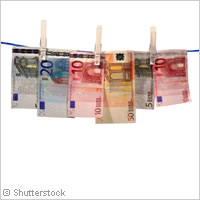Europeans use innovation to tackle money laundering
The EU is taking a bite out of money laundering, which is estimated at EUR 1 trillion worldwide. Helping the EU to stamp out this criminal activity is the BEINGRID ('Business experiments in GRID') project, which received more than EUR 15 million to implement and deploy grid solutions for European business sectors and to create a toolset repository of grid service components and best practice to support businesses that want to adopt this new technology. BEINGRID was supported under the 'Information society technologies' (IST) Thematic area of the EU's Sixth Framework Programme (FP6). The BEINGRID project partners tracked suspicious money laundering transactions by using cloud computing services. Experts say profit seizure is one way to nab criminals. The problem, however, is that innovative advances in IST have made criminals very tech savvy. Figures show that billions of transactions occur in banks each week and it is becoming a challenge for law enforcers to stop the criminals. On the plus side, money laundering does leave tracks through bank ledgers. Experts note that specific transaction patterns (how money is routed from one account to another and in what timeframe) give investigators a heads-up and encourages them to look into suspect cases of money laundering. The question, however, is how does one distinguish an honest business from a dishonest one? The BEINGRID project, which kicked off in 2006 and ended in 2009, created a series of 'Business Experiments' to develop the technology needed to give small and medium-sized enterprises (SMEs) real-world grid and cloud computing services. According to researchers, cloud computing evolves from grid computing and offers on-demand resource provisioning. The BEINGRID partners said the AMONG ('Anti-money laundering on Grid') Business Experiment developed detection services using grid technology. Grids benefit from unused processing and storage resources on computers around the globe. Grid computing takes a standard personal computer (PC) and transforms it into a supercomputer. The BEINGRID team added that cloud computing services give businesses and people the tools they need to use the Web so as to perform specific tasks. 'Through Grid SW (the GRIA service-oriented infrastructure), AMONG allows banks to cooperate in a cost-efficient, secure and controlled way,' said Damian Hubaux, head of Business Experiments in BEINGRID and manager of the Department of Research and Development (R&D) at CETIC (Centre d'Excellence en Technologies de l'Information et de la Communication), a BEINGRID partner. 'The solution allows banks to more efficiently spot money laundering than with the data available in a single institution. And more importantly, banks control the information given to competitors,' he added. It should be noted that no sharing takes place with regard to confidential banking. The partners said this solution gives the banks the help they need to comply with the EU's third Anti-Money Laundering (AML) Directive. Bankers, meanwhile, welcome the AMONG platform. 'AMONG takes the next step in providing a holistic view of money laundering activity, and most surprisingly at low cost, securely and regardless of the AML application installed in the bank,' explained Giorgos Panousopoulos, R&D project manager at Exodus SA in Greece, another BEINGRID partner. BEINGRID successfully developed more than 24 Business Experiments in 9 key sectors. Participating in this project were more than 95 partners from 10 countries including Belgium, France, Germany, Greece, Italy, Poland, Spain, Switzerland and the UK. The work has not stopped here. BEINGRID partners are cooperating on providing an online resource for SMEs and other groups that want to use grids.



